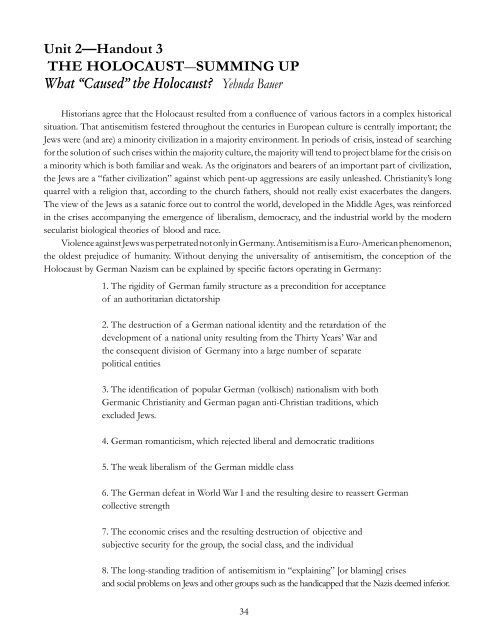Download - Canada ALPHA
Download - Canada ALPHA
Download - Canada ALPHA
You also want an ePaper? Increase the reach of your titles
YUMPU automatically turns print PDFs into web optimized ePapers that Google loves.
Unit 2—Handout 3<br />
THE HOLOCAUST―SUMMING UP<br />
What “Caused” the Holocaust? Yehuda Bauer<br />
Historians agree that the Holocaust resulted from a confl uence of various factors in a complex historical<br />
situation. That antisemitism festered throughout the centuries in European culture is centrally important; the<br />
Jews were (and are) a minority civilization in a majority environment. In periods of crisis, instead of searching<br />
for the solution of such crises within the majority culture, the majority will tend to project blame for the crisis on<br />
a minority which is both familiar and weak. As the originators and bearers of an important part of civilization,<br />
the Jews are a “father civilization” against which pent-up aggressions are easily unleashed. Christianity’s long<br />
quarrel with a religion that, according to the church fathers, should not really exist exacerbates the dangers.<br />
The view of the Jews as a satanic force out to control the world, developed in the Middle Ages, was reinforced<br />
in the crises accompanying the emergence of liberalism, democracy, and the industrial world by the modern<br />
secularist biological theories of blood and race.<br />
Violence against Jews was perpetrated not only in Germany. Antisemitism is a Euro-American phenomenon,<br />
the oldest prejudice of humanity. Without denying the universality of antisemitism, the conception of the<br />
Holocaust by German Nazism can be explained by specifi c factors operating in Germany:<br />
1. The rigidity of German family structure as a precondition for acceptance<br />
of an authoritarian dictatorship<br />
2. The destruction of a German national identity and the retardation of the<br />
development of a national unity resulting from the Thirty Years’ War and<br />
the consequent division of Germany into a large number of separate<br />
political entities<br />
3. The identifi cation of popular German (volkisch) nationalism with both<br />
Germanic Christianity and German pagan anti-Christian traditions, which<br />
excluded Jews.<br />
4. German romanticism, which rejected liberal and democratic traditions<br />
5. The weak liberalism of the German middle class<br />
6. The German defeat in World War I and the resulting desire to reassert German<br />
collective strength<br />
7. The economic crises and the resulting destruction of objective and<br />
subjective security for the group, the social class, and the individual<br />
8. The long-standing tradition of antisemitism in “explaining” [or blaming] crises<br />
and social problems on Jews and other groups such as the handicapped that the Nazis deemed inferior.<br />
34


